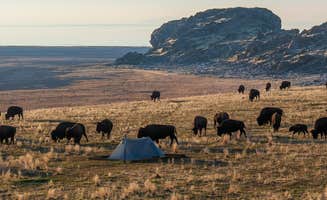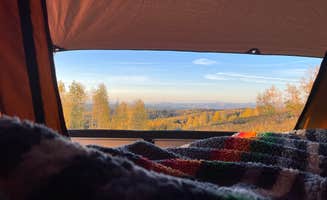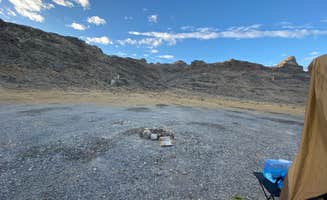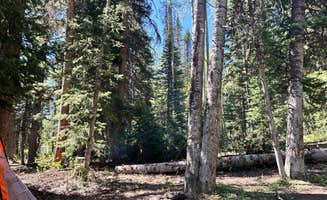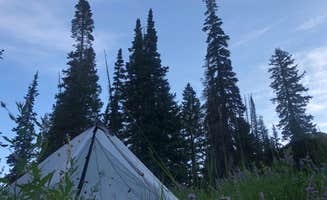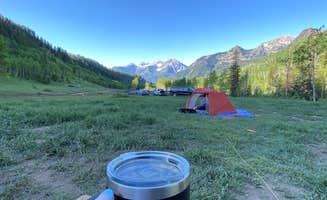Tent camping near West Point, Utah ranges from high-altitude mountain settings to desert landscapes with elevations spanning 4,200 to 10,000 feet. Summer temperatures typically reach 85-95°F during days with cooler 50-65°F nights in mountain areas. Winter camping requires preparation for sub-freezing temperatures, especially in higher elevations where nighttime temperatures can drop below 20°F even in early fall.
What to do
Mountain biking trails: Millcreek Canyon offers numerous trails for cyclists of varying abilities within 45 minutes of West Point. "Millcreek Canyon is home to some wonderful trails that can be accessed by foot or bike. Although the canyon offers many hiking trails, the main use of the trails seems to be for trail running," notes a Millcreek Canyon Backcountry Camping and Yurts visitor.
Fishing opportunities: Silver Flat Reservoir provides trout fishing within an hour's drive from West Point. "Both lakes were loaded with large trout, but I didn't have a fishing rod, so all I could do was look at them this time," explains a visitor to Red Pine Lake, which requires a 3-4 mile hike to access.
Wildlife viewing: Many camping areas offer opportunities to spot deer, moose, and various bird species. "Good hiking trails with great views and lots of animals to see," reports one camper who visited Split Rock Bay Backcountry Campsites at Antelope Island State Park.
What campers like
Alpine scenery: Higher elevation camping areas provide mountain vistas and cooler temperatures. A visitor at Silver Lake notes, "To the south you have a fantastic view of the Timpanogos Massif looming over the lake. To the west you'll see Box Elder Peak and to the north is Dry Canyon and the Alpine Ridge."
Accessible backcountry: Many tent camping locations require minimal hiking while providing a wilderness feel. "This area is easy to drive to. You do have to drive through a small river and must camp half a mile from the lake," reports a Silver Lake Backcountry camper.
Stargazing opportunities: Areas away from urban light pollution offer excellent night sky viewing. "The fall colors during the day and the stars during the night were spectacular!" shares a Silver Lake camper about their experience in the backcountry.
What you should know
Four-wheel drive requirements: Many dispersed camping areas have rough access roads. "You're definitely going to need 4WD and high clearance because the roads leading up to the campsite are filled with ruts and holes," advises a Silver Lake visitor.
Fire restrictions: Several camping areas, particularly in watershed zones, prohibit campfires. "No fires or pets are allowed given that Little Cottonwood Canyon is considered Watershed. So plan on cooking with a backpacking stove/cooker," explains a Red Pine Lake camper.
Seasonal limitations: Some areas have restricted access during certain times. "Camping doesn't open until July 1st so take that into account," warns a visitor to Millcreek Canyon.
Tips for camping with families
Close-to-town options: Some sites provide backcountry experiences without long drives. "Aside from the excessive litter in a few places, this was a great place to give my 5-year-old a taste of backpacking," shares a visitor to Cook Campsite.
Water-based activities: Several camping areas include lakes or streams for recreation. "We spent our afternoons paddleboarding on Silver Lake Reservoir," reports one family who visited the area.
Winter alternatives: Some locations transform for cold-weather activities. "This is a fantastic spot to go in the winter. Not only is it more beautiful (IMO) in the winter, but it gets loads of snow for snow sports," writes a visitor to Port Ramp Marina, noting "Huntsville, which is a ten minute drive away also has an awesome field that they turn into a skating rink."
Tips from RVers
Dispersed camping with space: Monte Cristo area offers larger sites for RVs with adequate distance between campers. "Vyery surprised by this dispersed camping. Good Spread, amazing views and the road up ain't bad at all," writes a visitor to dispersed camping near Monte Cristo.
Water crossing awareness: Some camping areas require crossing water features. "Must cross a creek with 12"-18" of water at least once and up to 4 times depending on which camp site you choose," advises an RVer who visited Silver Lake.
Weekday arrivals recommended: Popular sites fill quickly on weekends. "There are tons of free site all up and down the main road. The only problem is it is busy if you leave on Friday plan to get there by 3 at the latest. Spots fill quick," notes a Monte Cristo camper.


